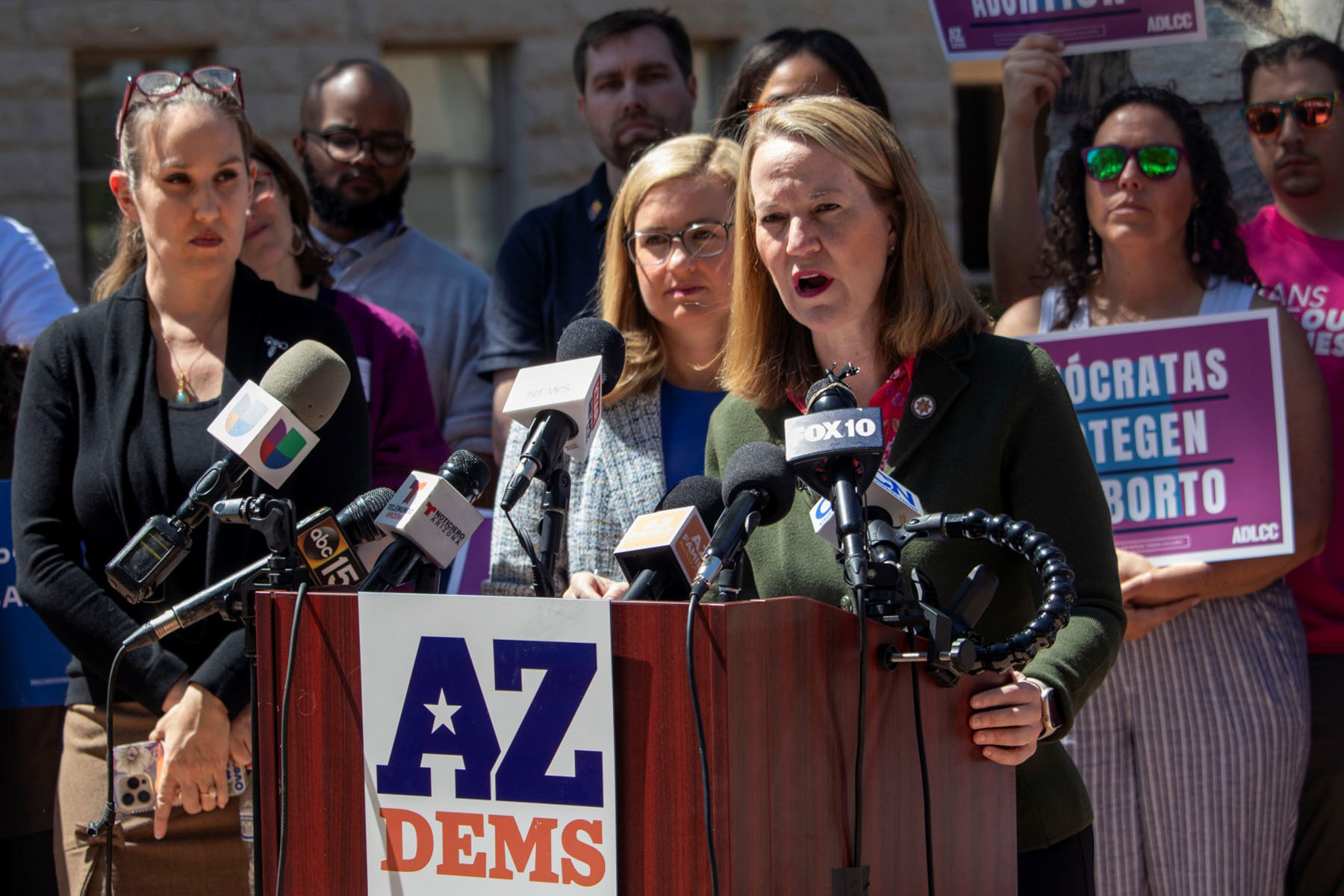Editor’s note: This article has been updated throughout.
Arizona doctors have the final say when deciding if a woman needs an emergency abortion, Attorney General Kris Mayes concluded in a legal opinion her office released Thursday.
“Absent proof of bad faith, nothing in the statute allows the physician’s judgment to be second-guessed after the fact, even if other physicians might have come to a different conclusion,” Mayes wrote.
The Grand Canyon State is currently under a gestational ban that prohibits abortions after 15 weeks, though the law includes exceptions for procedures performed to prevent a patient’s death or the impairment of a “major bodily function.” Doctors who violate the law’s mandates face a class 6 felony, which may result in a prison sentence of between 4 months and 2 years, and could lead to a revoked medical license.
Concerned about how the threat of criminalization might cause doctors to delay care, a group of Democratic lawmakers requested that Mayes clarify the law’s exceptions, to help medical professionals better understand under what circumstances they can legally perform an abortion beyond the 15-week deadline.
On Thursday, Mayes said the ultimate determination for what constitutes a medical emergency lies in the hands of doctors — and they can’t be taken to court over an abortion they provided in good faith.
-
Read Next:
What does the AG opinion say?
The law states that an emergency abortion can only be provided based on a physician’s “good faith clinical judgment,” which Mayes pointed out has long been accepted as being subjective. A doctor’s reasoning relies on years of training and experience as well as their interpretation of a specific patient’s condition. And every situation is unique, Mayes said.
“Whether a ‘medical emergency’ exists…hinges entirely on the treating physician’s ‘good faith clinical judgment’ that one exists,” she wrote.
To arrive at that judgment, a doctor must complete a two-part test. First, the doctor should carry out an assessment of the patient using their clinical training and medical expertise. Then, the doctor must determine, based on an honest review of the information, that a medical emergency exists. And that medical emergency needs to fall under the law’s exceptions, which are the prevention of death or the avoidance of a “substantial and irreversible impairment of a major bodily function.”
Unlike in other states, where Republican lawmakers have made the doctor’s judgment contingent on a comparison with the hypothetical judgment of other doctors in similar circumstances — forcing physicians to consider how others in their field might view their decisions — Arizona Republicans left the decision-making up to the actual doctor in the room at that moment, Mayes concluded in her analysis.
That means doctors can’t be prosecuted after the fact for abortions they provided past the 15-week mark unless there’s evidence that they didn’t act in good faith. Simply because other doctors or prosecutors disagree that an abortion was the right decision doesn’t allow for legal action against the doctor who provided it. It’s enough, Mayes wrote, that the doctor honestly believed that denying their patient an abortion would have caused irreversible harm or led to the patient’s eventual death to justify the procedure.
“It does not matter…whether a prosecutor (or other doctors) might later believe that the physician objectively erred in her conclusion,” she wrote. “Because the Legislature chose to focus on the treating physician’s mental state at the moment of her medical emergency determination, no prosecutor can second-guess a treating physician’s clinical judgment that an abortion was warranted, absent proof of bad faith.”
And, Mayes added, abortions intended to prevent the death of the pregnant patient don’t have an immediacy requirement, meaning that doctors don’t need to wait until the patient is at imminent risk of dying before performing an abortion.
The law states that abortions beyond 15 weeks are allowed when women are dealing with pregnancy complications that “necessitate the immediate abortion of her pregnancy to avert (the woman’s) death,” but it makes no mention of how near to death a woman must actually be to warrant that abortion. While women in other states with similarly restrictive abortion bans have been denied abortions until they present with life-threatening conditions that require immediate care, like sepsis or hemorrhaging, Arizona doctors don’t need to wait that long, Mayes said.
Instead, the determination of when to provide an abortion goes hand-in-hand with the conclusion that a patient is in the midst of a medical emergency.
“The medical emergency exception is triggered as soon as the treating physician forms an honest clinical judgment that an abortion is the indicated treatment for a patient’s condition in order to avert death,” Mayes wrote. “So, for instance, if the treating physician examined a patient and determined that the patient’s condition would lead to death within 24 hours, the physician need not wait until hour 23 (or 22, 21, or 20, etc.) to perform an abortion—the physician need not wait at all.”
In fact, Mayes said, interpreting the law as requiring doctors to wait until women are at death’s doorstep before providing an abortion would directly conflict with the stated intent in the law’s underlying legislation, which purported to protect the “health of women.”
The law’s exception for a medical emergency that threatens to impact a woman’s “major bodily function” is even more dependent on a doctor’s judgment call, according to Mayes. Nor does the law attempt to constrain what kinds of bodily functions must be impacted to necessitate an abortion, she argued.
The text of the law states that a major bodily function “includes” the immune system, normal cell growth, and the digestive, bowel, bladder, neurological, brain, respiratory, circulatory, endocrine and reproductive functions. But Mayes said that the use of the word “includes” means the list in the law isn’t exhaustive, and that other, unlisted bodily functions may qualify. In the end, she said, lawmakers left doctors in charge of determining when an abortion is needed to ensure a woman’s normal bodily functions are preserved.
“What constitutes a ‘substantial and irreversible’ impairment, and what degree of risk rises to the level of ‘serious risk,’ are likewise questions for the treating physician to determine according to her good faith clinical judgment,” Mayes wrote.
The attorney general added that the personal choices made by patients in similar cases aren’t an indication that a doctor’s advice to undergo an abortion was made in bad faith. For example, if a doctor diagnoses two pregnant patients with cancer and determines that an abortion is warranted under the 15-week law’s exceptions, but one of the patients refuses the abortion, that doesn’t constitute evidence of a bad faith judgment from the doctor if the other patient opts for an abortion.
Mayes also concluded that ectopic pregnancies and miscarriages don’t fall under the state’s definition of an abortion, and doctors shouldn’t hesitate to provide care in those situations because those cases aren’t ruled by the 15-week law. Reproductive rights advocates and medical professionals across the country have expressed concern that the treatments for miscarriages and ectopic pregnancies, which involves the removal of dead fetal tissue or a fetus that has implanted outside the uterus, which can be deadly to the woman, are similar to procedures used in abortions and may result in denied medical care in states with restrictive laws.
Mayes: mental health may be exempted
During a Thursday morning news conference, Mayes touted her opinion as a defense against lawsuits launched by county attorneys and implied the 15-week law might also include some leeway for women with mental health conditions, though her legal opinion was silent on mental health matters.
While the law threatens doctors who violate its mandates with a class 6 felony, Gov. Katie Hobbs issued an executive order last year that centralized all prosecutorial authority for violations of the law in the state attorney general’s office. And Mayes has repeatedly vowed never to take any medical professional to court over it. On Thursday, she reiterated that promise, and said her opinion acted as both an assurance for doctors across the state and a warning for county attorneys who may seek to go over her head.
“As the top legal officer in this state, let me be perfectly clear: Arizona law does not allow for the prosecution of a treating physician who exercises their clinical judgment in good faith to provide an abortion under the medical emergency exception, full stop,” Mayes said. “I am making it clear to all county attorneys that the law does not allow you to prosecute medical providers acting in good faith according to their clinical judgment and providing abortion care in medical emergencies.”
Shortly after Hobbs issued her executive order, a group of county attorneys threatened to sue her, though no such challenge has yet been filed. And some county attorneys have expressed a willingness to enforce abortion bans.
Maricopa County’s Rachel Mitchell has said her office considers the merit of every case, and that it would do the same with potential abortion law violations. Yavapai County’s Dennis McGrane, meanwhile, advocated for the 1864 near-total abortion law in legal filings that was briefly reinstated by the Arizona Supreme Court earlier this year before being repealed by the legislature.
When pressed about the opinion’s implications for victims of rape or incest, Mayes said the 15-week law, which includes no exceptions for resulting pregnancies, may actually provide some flexibility for doctors who feel their patients are dealing with co-occurring mental health conditions that could be life-threatening, such as depression or suicidal thoughts. Mayes pointed out that the law’s exception for conditions that could lead to “substantial and irreversible impairment of a major bodily function” includes neurological functions and the brain.
“When you actually look at the law, there is a lot of room for doctors,” she said. “And one has to presume that the legislature deliberately did that.”
Doctors and abortion providers lauded the opinion as a much-needed respite amid concerns of criminalization.
Dr. Jill Gibson, an OB-GYN and the chief medical director of Planned Parenthood Arizona, which runs four of the state’s nine clinics that offer abortions, said that the barriers erected by the 15-week ban are antithetical to the professional commitment to life-saving care that all doctors make. And, she said, politicians have no place attempting to constrain the complex medical decisions physicians confront every day.
“The provision of medical care, including abortion care, is individualized to every patient and their specific circumstances. These decisions regarding their care can only be made between a physician and her patient, through a trusted, therapeutic relationship founded on the underlying principle of all medical care — which is to do your absolute best to heal the patient,” Gibson said. “The draconian parameters created by non medical lawmakers cannot and do not capture the nuance that is required to deliver medical care.”
Gibson said Mayes’ legal opinion would help dispel confusion in the medical community and help doctors feel more secure in their decisions. Prior to the opinion, she said, clarity was sorely needed as doctors sometimes hesitated to provide routine care. Gibson shared that one of her colleagues, shortly after the court overturned Roe v. Wade two years ago, was unwilling to perform an amniotomy, in which the amniotic sac is artificially ruptured to speed up delivery, despite her patient being in painful preterm labor at 20 weeks with an unviable fetus. Despite the critical need for the procedure, the OB-GYN feared she would be criminalized.
Dr. Dan Schnorr, an emergency room physician, echoed that fear, saying that he and many of his colleagues were uncertain whether their decisions to provide emergency abortions for women who were hemorrhaging or suffering from an infection would later be used against them in court.
Doctors may begin by stabilizing pregnant patients facing infections or excessive bleeding by giving them antibiotics or blood transfusions, Schnorr said, but for many, an abortion is ultimately necessary.
“In those cases, some people, some lawyer, could come back and say afterwards, ‘I’m not sure that you actually needed to do that, you could’ve given more blood, you could’ve given more antibiotics,’” he said. “As physicians, we’re concerned that — we’re at the bedside with the patient — and then later on somebody, who maybe has some kind of agenda, is going to come and sue us.”
Some were skeptical about the long-term protection offered by Mayes’ legal opinion.
Dr. Misha Pangasa, a Phoenix OB-GYN and member of the Committee to Protect Healthcare, a left-leaning advocacy group that pushes for reproductive rights, said that the only bulletproof solution is enshrining abortion rights in the state constitution. The Arizona Abortion Access Act is expected to go before voters in November and seeks to guarantee access to abortion up to 24 weeks of gestation, with exceptions beyond that point if a doctor deems it necessary to safeguard a patient’s life, mental or physical health.
“Physicians appreciate Attorney General Mayes’ opinion, but in no way is it a permanent protection for our patients,” said Pangasa, in an emailed statement. “As other politicians continue to attack reproductive health care, we cannot rely on one opinion to keep our patients safe. We must pass the Arizona Abortion Access Act to ensure state law agrees that doctors are able to care for our patients to the best of our ability, without fear of prosecution, for generations to come.”
Chris Love, a spokeswoman for the campaign behind the abortion rights ballot measure, added that, despite Mayes’ opinion helping provide clarity and safety for some patients, the state remains under a restrictive 15-week law.
“We appreciate that the Attorney General feels there may be some emergency protections on a case-by-case basis, but the fact is the opinion of one politician offers no lasting clarity or reliability for Arizona medical professionals or patients,” she said in an emailed statement. “Only the Arizona Abortion Access Act creates an enduring Constitutional protection ensuring Arizona patients, their families and their medical providers have the right to make our own decisions about pregnancy and abortion. Nothing has changed about the need to pass the Arizona Abortion Access Act in November.”
Arizona Mirror is part of States Newsroom, a nonprofit news network supported by grants and a coalition of donors as a 501c(3) public charity. Arizona Mirror maintains editorial independence. Contact Editor Jim Small for questions: [email protected]. Follow Arizona Mirror on Facebook and X.





